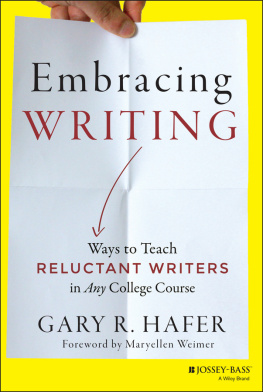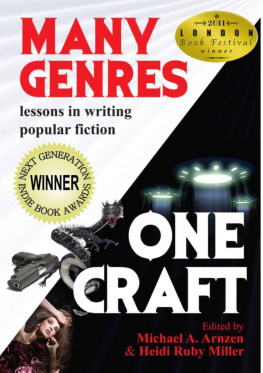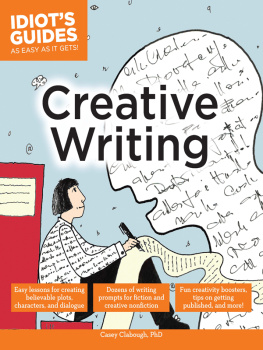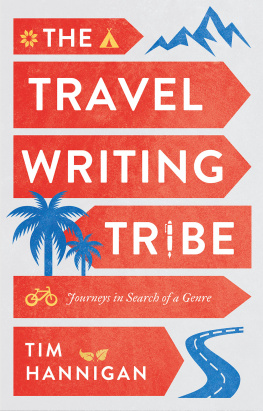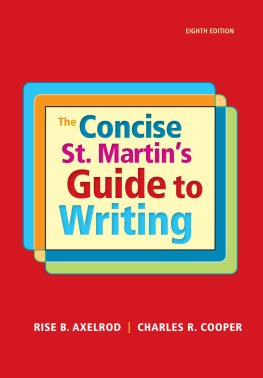The Anthropologist as Writer
T HE A NTHROPOLOGIST AS W RITER
Genres and Contexts in the Twenty-First Century

Edited by
Helena Wulff

Published by
Berghahn Books
www.berghahnbooks.com
2016 Helena Wulff
All rights reserved. Except for the quotation of short passages for the purposes of criticism and review, no part of this book may be reproduced in any form or by any means, electronic or mechanical, including photocopying, recording, or any information storage and retrieval system now known or to be invented, without written permission of the publisher.
Library of Congress Cataloging-in-Publication Data
Names: Wulff, Helena, editor.
Title: The anthropologist as writer : genres and contexts in the twenty-first century / edited by Helena Wulff.
Description: New York : Berghahn Books, [2016] | Includes bibliographical references and index.
Identifiers: LCCN 2015034312| ISBN 9781785330186 (hardback : alk. paper) | ISBN 9781785330193 (ebook)
Subjects: LCSH: EthnologyAuthorship. | Communication in ethnology. | Literature and anthropology.
Classification: LCC GN307.7 .A56 2016 | DDC 305.8/00723dc23
LC record available at http://lccn.loc.gov/2015034312
British Library Cataloguing in Publication Data
A catalogue record for this book is available from the British Library
ISBN 978-1-78533-018-6 (hardback)
ISBN 978-1-78533-019-3 (ebook)
Contents

Helena Wulff
Dominic Boyer
Don Brenneis
Sverker Finnstrm
Brian Moeran
Mirad Nic Craith
Alma Gottlieb
Paul Stoller
Narmala Halstead
Kirin Narayan
Anette Nyqvist
Oscar Hemer
Eva-Maria Hardtmann, Vincent Manoharan, Urmila Devi, Jussi Eskola, and Swarna Sabrina Francis
Nigel Rapport
Mattias Viktorin
Paula Uimonen
Ulf Hannerz
Tables

.
(Source: Ethnologue: http://www.ethnologue.com/statistics/size)
.
(Source: Grove 2013)
Source: Reuters)
(Source: Ethnologue: http://www.ethnologue.com/statistics)
Acknowledgments

This volume originates from the fifth Stockholm Anthropology Roundtable, which I organized at Stockholm University. The Stockholm Anthropology Roundtable is an annual forum for international discussion of current and emergent issues in the discipline.
I am grateful to all speakers for thoughtful presentations that developed into inspiring discussion. In particular, I am grateful to those speakers who turned their presentations into chapters for this volume. They constitute the bulk of the volume. Later, I invited some additional contributors. I owe them special thanks.
My greatest debt is to Marion Berghahn for her splendid support and extraordinary efficiency. It is always a true delight to work with her. It has also been a great joy to work with Molly Mosher, Duncan Ramslem, and Jessica Murphy, editorial and production assistants at Berghahn Books. I am very grateful to Kinga Jankus for compiling the index. Many thanks to my niece, Victoria Wulff, for taking the cover picture.
The fifth Stockholm Anthropology Roundtable was funded by Henrik Granholm Foundation, Stockholm University.
Stockholm, February 2015
Helena Wulff
Introducing the Anthropologist as Writer
Across and Within Genres
Helena Wulff

There you are: facing the computer screen. Your field, whatever that was, is some distance away, at least for now. You have worked through the materials you collected there, and think you have them in a promising order. Time for the next step: to write. You may not get away from the screen any time soonnot really get away.
Then at some later point, you are there again in front of the screen, checking your emails. Has that publisher or editor you had in mind been in touch yet, responding to your proposal, or even to that entire manuscript you sent? If so, expectat besta period in front of the screen again, reviewing, rewriting, perhaps reorganizing.
Anthropologists have mostly celebrated the field experience in all its variety. Yet in fact, they are likely to spend as much time sitting in front of the computer screen. Once it has begun, writing is in one way a very solitary activity, but in another way, it is not: you may be in interaction with an imagined audience of colleagues, students, as well as people in your field, perhaps general readers, and, increasingly, the representatives of academic audit culture.
For some time now, anthropologists have understood that they are also writers, and have engaged in scrutinizing the implications of this fact. Clifford Geertz, in his influential book The Interpretation of Cultures (1973: 19), famously asked (in the idiom of the time): What does the ethnographer do?He writes. Taking existing conversations on writing in anthropology as a point of departure, the mission of this volume is twofold: first, to identify different writing genres anthropologists actually engage with; and second, to argue for the usefulness and necessity for anthropologists of taking writing as a craft seriously and of writing across and within genres in new ways. This introduction will contextualize writing in anthropology historically and theoretically, move on to my own experience of writing dance journalism as one instance of broadening anthropological writing, and conclude by offering an overview of ways of writing anthropology as discussed in the following chapters.
What writing genres are anthropologists expected, in various contexts, to master in the twenty-first century? Anthropological writing is a timely topic as it shapes the intellectual content of the discipline, as well as careers and institutional profiles. Academic scholarly writing is obviously the primary genre for anthropologists, and the recent debate has had its center of gravity here. Yet anthropologists also do much writing in many styles and genres other than academic scholarly writing. Writing for various administrative contexts, which includes not one but a number of changing genres, isbecause of their control over academic valuesregarded as an expanding problem by many, if not most, anthropologists with intellectual drives. Sooner or later most anthropologists find themselves writing academic administrative texts, filling in extensive forms, and filing reports (Brenneis 2009). With increasing demand, many anthropologists also develop a capacity to write reports commissioned by development agencies, municipalities, and business corporations. But there is also significant cultural, social, and political critique communicated through anthropological writings (Gusterson and Besteman 2010). There are anthropologists who write memoirs (Narayan 2007; Stoller 2008; Collins and Gallinat 2010), and fiction, as commented on by Ruth Behar in the book chapter Believing in Anthropology as Literature (2009). Anthropologists have taken an interest in writing novels (Stoller 1999), poetry (Tedlock 2002), and even crime novels (White 2007) inspired by ethnography. The fact that anthropologists also are engaged readers of detective stories has been examined by Regina Bendix (2012). Ulf Hannerz (2013) has written about a legendary Swedish detective story writer, Stieg Trenter (whose idiosyncratic spelling of his first name most likely influenced Stieg Larsson of the globally best-selling Millennium Trilogy when he changed his name from Stig to Stieg), pointing out similarities between anthropologists and detective story writers. Travel writing, especially that describing dark sides such as violence and security issues, is examined by Skinner (2012).
Next page


